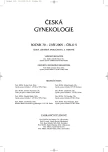-
Medical journals
- Career
Antifungal Effect in Selected Natural Compounds and Probiotics and their Possible Use in Prophylaxis of Vulvovaginitis
Authors: M. Hronek; D. Vachtlová; Z. Kudláčková; P. Jílek
Authors‘ workplace: Katedra biologických a lékařských věd Farmaceutické fakulty v Hradci Králové, LF UK, Praha, vedoucí pracoviště doc. RNDr. V. Semecký, CSc.
Published in: Ceska Gynekol 2005; 70(5): 395-399
Category: Retraining
Overview
Objective:
a survey of effective natural compounds and probiotics with antifungal activity and their possible use in vulvovaginitis as a prophylactic or therapeutic drug.Design:
review of literature.Setting:
Charles University at Prague, Pharmaceutical Faculty at Hradec Králové.Methods:
and review of literature and publications from medical data-bases.Conclusions:
certain natural compounds were proved to exert antimycotic effects. The efficiency of garlic
extract under in vitro conditions against yeast of C. albicans family becomes manifest within one hour. Essential oils present in the Cayenne pepper (Capsodum frutescens) exert considerable antifungal activity against C. albicans as well. Clove exerts lower antimycotic effects. The effects of Chinese leek are similar to garlic. Propolis also possesses antifungal properties, and sensitivity of the yeast strains decreases in the following order: C. albicans > C. tropicalis > C. crusei > C. guilliermondii. Its efficiency depends on the composition and place of origin. Tea trea oil (Melalauca alternifolia) is inhibiting strains of Candida family (genus) in minimal inhibiting concentration, higher concentrations are necessary for C. crusei and C. norvengensis. In the prophylaxis of vaginal candidoses, oral administration of the strains of Lactobacilus rhamnosus GR-1 and L. fermentum RC-14, B-54 may be recommended. Moreover there are suitable strains of L. brevis CD-2, L. salivarius FV-2, L. gasseri MB 335, L. plantarum, useful in the form of gel capsules (L. plantarum) or vaginal tablets (L. gasseri). The strains of L. acidophilus CRL 1294 and L. salivarius CRL 1328 display the capacity of self aggregation and co-aggregation with Candida. It should be pointed out that the probiotic strain of Lactobacillus (especially L. casei and L. rhamnosus) may, in exceptional cases, cause bacteriemia and sepsis, especially in immunodeficient patients and those who underwent surgery of alimentary tract. No protective effect against yeast infection was detected with vitamin E, any positive effect was not unequivocally confirmed with zinc, but adjusting zinc levels to normal may be recommended.Key words:
vulvovaginitis, antifugal effects, natural compounds, probiotics, zinc
Labels
Paediatric gynaecology Gynaecology and obstetrics Reproduction medicine
Article was published inCzech Gynaecology

2005 Issue 5-
All articles in this issue
- Electrophoretic Analysis (SDS PAGE) of Ovulatory Cervical Mucus in Patients with Fertility Failure and after Unsuccessful IVF
- Does Oocyte Retrieval Influence the Following Morphological Quality of Embryos?
- Prevention of Multiple Pregnancy after IVF/ICSI by Elective Single Embryo Transfer – Pilot Study
- Risk Factors Associated with High Birthweight Deliveries
- The Perineal Body Length and Injury at Delivery
- Pregnancy and Labor after Combined Pancreas – Kidney Transplantation in Czech Republic
- Reimplantation of Heart Valve Prosthesis at the 25th Week of Gestation
- Changes in Values of Urethral Closure Pressure and its Position after TVT Operation – Predictive Value of MUCP and VLPP for Successful Rate of this Operation
- Relationship between the Levels of Toxic Polychlorinated Biphenyls in Blood and Follicular Fluid of Sterile Women
- Embolization of Uterine Arteries during Myoma Treatment from the Patient’s Point of View
- Neurological Complications during Gynecological Pelvic Surgery
- SHBG – New Possibilities of Diagnostic Use in Obstetrics and Gynecology
- Antifungal Effect in Selected Natural Compounds and Probiotics and their Possible Use in Prophylaxis of Vulvovaginitis
- Czech Gynaecology
- Journal archive
- Current issue
- Online only
- About the journal
Most read in this issue- The Perineal Body Length and Injury at Delivery
- Embolization of Uterine Arteries during Myoma Treatment from the Patient’s Point of View
- Antifungal Effect in Selected Natural Compounds and Probiotics and their Possible Use in Prophylaxis of Vulvovaginitis
- Does Oocyte Retrieval Influence the Following Morphological Quality of Embryos?
Login#ADS_BOTTOM_SCRIPTS#Forgotten passwordEnter the email address that you registered with. We will send you instructions on how to set a new password.
- Career

